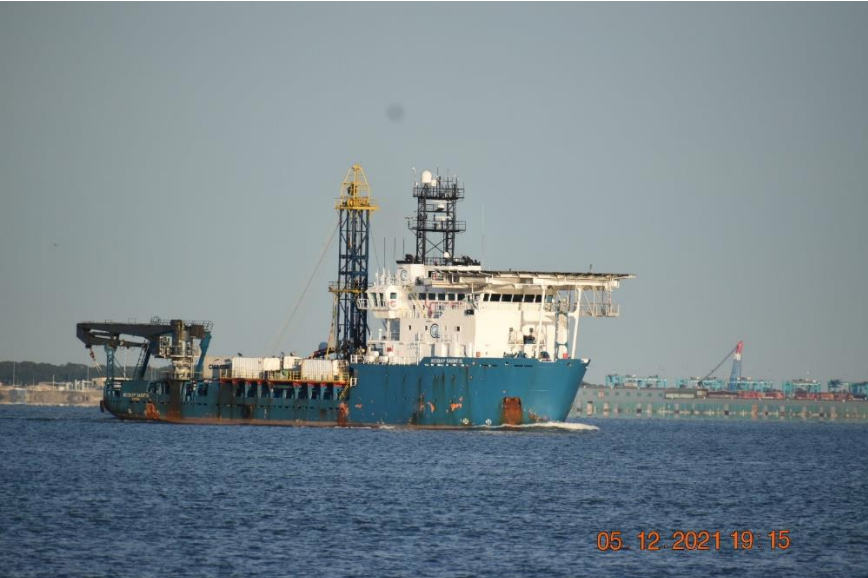Operators of a foreign-flag geotechnical survey vessel have been in violation of the Jones Act while working on a Virginia offshore wind energy project, a U.S. offshore industry group alleges in a new report.
The 264-foot vessel Geoquip Saentis, “a Chinese-built, Bahamian-flagged, Swiss-owned offshore supply vessel…operated for most of 2020 and 2021 in U.S. offshore wind fields,” including survey work for the Dominion Energy Coastal Virginia Offshore Wind project and the Vineyard Wind project off southern New England, according to the paper by the Offshore Marine Services Association.
In the 34-page paper – addressed to top Coast Guard and U.S. Customs and Border Protection officials – OMSA makes specific complaints about alleged violations of the 1920 Merchant Marine Act and other laws. Also known as the Jones Act, the law requires how maritime commerce between U.S. points must be conducted by U.S.-flagged and crewed vessels.
“U.S. wind power should mean U.S. jobs,” said OMSA President Aaron Smith in releasing the report. “Our report provides a case study of how far too often wind projects are instead creating jobs for Estonians and Romanians, while capable American mariners sit on the shore.
"We’ve detailed how a foreign company – by their own admission – used a Chinese-built vessel with foreign crew members to transport cargo within U.S. waters. That's illegal.”
A spokesman for Dominion Energy said the company is reviewing the OMSA report. In a rebuttal Tuesday operator Geoquip Mainre disputed among other points OMSA's complaint of Jones Act cargo violations."
One key allegation in the paper is that seafloor soil samples transported by a foreign-flag survey vessel to shore for testing constitute “merchandise” as described in the Jones Act.
Geotechnical work is ongoing all along the East Coast for planned wind projects, so the OMSA report is a signal that Jones Act complaints from U.S. offshore service providers will be a ongoing debate as they have been for years in the Gulf of Mexico oil and gas industry.
Among OMSA’s complaints list:
• “The Geoquip Saentis has repeatedly transported and continues to transport merchandise between U.S. points, including transporting subsoil samples from points on the U.S. Outer Continental Shelf (“OCS”) to U.S. ports for testing. That transportation violates the Jones Act.”
• “It has also employed a crew of Eastern European mariners without the proper documentation required by the Outer Continental Shelf Lands Act (OCSLA). These mariners are paid wages far below the wages commanded by similarly situated U.S. mariners. U.S. law requires U.S. vessel operators to utilize U.S. mariners. Thus, this practice unfairly allowed the Geoquip Saentis to operate at a lower cost than U.S.-flagged vessels, which has permitted it unlawfully to obtain work reserved by the Jones Act to U.S.- flagged vessels.”
• “The vessel appears to have repeatedly turned off or otherwise made inaccessible its Automatic Identification System (AIS) signal, a violation of U.S. law and international safety regulations.”
• “The vessel has been in non-compliance with U.S. pollution prevention laws, resulting in its receipt of two U.S. Coast Guard (USCG) Captain of the Port (COTP) orders denying entry into U.S. ports; similarly, it has been found to be an “acknowledged pollution source” as part of a USCG oil spill investigation.”
• “The USCG has allowed the Geoquip Saentis to sail as an “Offshore Supply Vessel” despite clearly meeting the definition of a vessel a requiring a higher level of safety regulations. An allowance that would not be provided to a U.S.-flagged vessel.”
Geoquip Marine's response addressed the OMSA allegations.
"All Geoquip Marine research vessels meet the highest international standards of operations and all Geoquip Marine crew are highly trained and have all the necessary permissions to work, regardless of where they are in the world.
'It is wrong to insinuate that Geoquip Marine crew are hired at rates below industry standards. Geoquip Marine prioritises the crew welfare in its quest for accuracy and those crew are very well treated, very well rewarded and are given continual training to guarantee that they are able to operate to the highest standards of safety and efficiency. As a result, Geoquip Marine is renowned internationally for being an excellent employer and this is a vital factor in securing the services of the very best crew members.
"Geoquip Marine is proud to be able to boast that as a result of its exhaustive working practices it has industry-leading safety standards of any operator in its market.
"Geoquip Marine vessels do not transport cargo or merchandise. The Geoquip Saentis is an IGSV, it is dedicated to research and has world-leading drilling technology and an onboard laboratory. It collects seabed data, allowing geotechnical parameters to be derived and supporting environmental research.
"Geoquip Marine has historically relied upon the longstanding position that research work of the type that it is specifically focused on analysing the characteristics of the seabed is not covered by the provisions of the Jones Act."
The paper is the second report issued by OMSA under its “Jones Act Enforcer” program, named for a former offshore supply vessel the association commissioned to conduct surveillance of foreign-flag vessels working in U.S. waters.
In the first report issued in August, OMSA described a Chinese-built, Vanuatu-flagged derrick barge called the Epic Hedron transporting merchandise – in that case, oil platform jackets – between points off the coast of Louisiana in violation of the Jones Act. OMSA also obtained Coast Guard reports of safety and pollution violations involving the vessel.







